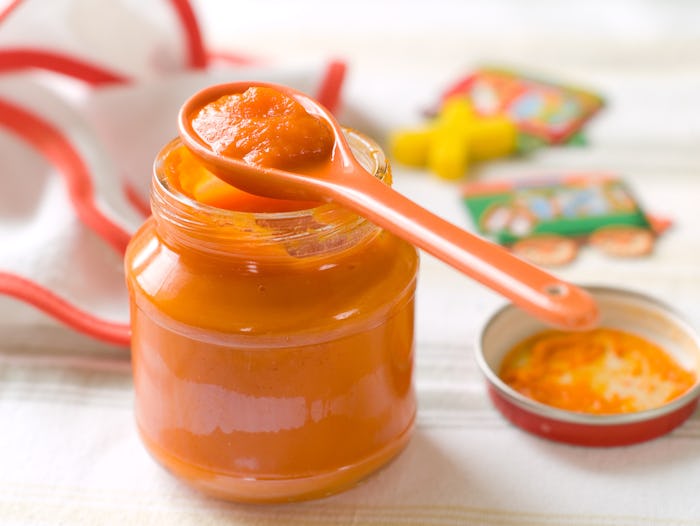There are a lot of decisions you make as a parent that can affect the health of your kids, and what to feed them is one of the biggest. Though there's a lot of debate when it comes to foods and whether going organic, non-GMO, or preservative-free is best, there's no doubt that you should research your options before you decide what's best for you and your family. As your little one forays into the world of solid foods, you might wonder, "what are the preservatives in baby food?"
According to Parents, most pre-packaged baby foods contain just the ingredients listed on the package. But, unless the brand is certified organic, you won't know whether or not the produce used to make the baby food was exposed to pesticides or other chemicals. Even then, some brands have recently come under criticism for deceptive marketing, as many of them are labeled organic, but contain inorganic ingredients.
Being informed is the most you can do as a parent, really, and there's essentially pros and cons to every parenting decision. When it comes to baby food, it's the essentially the same. Pre-packaged baby foods offer many pros and many cons, as do homemade baby foods. What it comes down to is which issues are a priority for your family.
As Cleaveland Clinic mentioned, one of the major downsides of pre-packaged baby foods is the preservatives within it. Though vitamin C is OK as a preservative, many of the others aren't as recommended.
According to The Washington Post, immune diseases, gastrointestinal symptoms, and even behavioral problems, such as attention-deficit hyperactivity disorder, have all been blamed on food additives. But, there are no data behind these suspicions. In fact, as The Washington Post mentioned, most of these food dyes and additives have been studied and found safe for consumption.
According to Helathy Child Healthy World, there are certain preservatives and additives that should be avoided. The riskiest additives are artificial colors, chemical preservatives (like butylated hydroxyanisole (BHA), sodium nitrate, and sodium benzoate), artificial sweeteners, added sugar (high fructose corn syrup), and added salt (in any form).
Unfortunately, there is a sacrifice with every decision, and though making your own baby food at home allows you to control the quality of ingredients, it also requires a bit more time, which can lead to a bit more inconvenience. Each individual family has its own priorities, and deciding what is best for yours will always result in making the best choices for your family.
